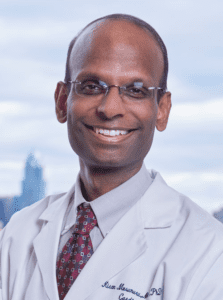By Kiran Musunuru, MD, PhD, MPH, ML

As a representative of the American Society of Human Genetics, I had the privilege of attending the Human Genetics Asia 2023 conference in Tokyo, Japan, from October 12-14, 2023, to participate in a Global Forum entitled “Translating human genetics and genomics into the future: Foresights, hurdles and global co-operation.” Led by Professor Kenjiro Kosaki of Keio University in Tokyo, Japan, the conference was a special first-of-its-kind coordination of the annual meetings of the Japan Society of Human Genetics, Asia Pacific Conference on Human Genetics, and East Asian Union of Human Genetics Societies. The conference boasted thousands of attendees from across the globe, most of them medical genetics professionals.
Immediately following a keynote address by Professor Svante Pääbo, the recipient of the 2022 Nobel Prize in Physiology and Medicine, the Global Forum featured eight panelists from around the world, which covered a broad range of highly topical themes in genetics and genomics research in a brisk two-hour session: (1) promoting diagnostic precision; (2) promoting preventive genetic medicine; (3) equity in delivering genetic services; (4) fostering the young generation; and (5) creating a bright future through learning from visionaries.
Rather than being formatted as a series of extended lectures from the panelists, the Global Forum interspersed five-minute flash talks from the panelists; pre-recorded video clips from a wide variety of genetics and genomics researchers, practitioners, and advocates ranging from Professor Masafumi Matsuo, who first proposed antisense oligonucleotide exon-skipping therapy for Duchenne muscular dystrophy, to Helene Cederroth, president of the Wilhelm Foundation and co-founder of the Undiagnosed Diseases Network International, to research and clinical trainees from countries throughout East and Southeast Asia; live polls to assess the uptake of genetics and genomics practices in the countries represented by the attendees; and lively question-and-answer breaks. It was certainly a unique session!

My flash talk on “Predictive cardiovascular genetics as a gateway to interventional genetics” highlighted how the ability to “read” the genome (rapid, inexpensive exome and genome sequencing) and to “understand” the genome (improved approaches to interpretation of variants of uncertain significance) will lay the groundwork to “rewrite” the genome (gene editing to correct pathogenic variants and to alter disease modifiers) for the benefit of patients everywhere.
Other talks in the session particularly caught my attention. The need for equity in genetic service delivery—challenges in accessibility can be more daunting that what I have observed in the U.S. yet just as urgently need solutions. For example, there are 2,000 inhabited islands in the Philippines, with no prospect that genetics professionals will be able to meet with all patients in person; telemedicine seems the only viable solution. The Asia Pacific Society of Human Genetics organized “summer schools” in Hong Kong and Singapore to teach skills in genetics and genomics to clinical practitioners. This effectively brought the learners and instructors together. Additionally, there are current efforts to establish neonatal genome sequencing of well babies in Australia.
As a representative of ASHG, I was also invited to give a plenary talk on a topic of my choosing. I focused on my own research on therapeutic gene editing; mindful that I was far from home, I sought to present a much more international perspective than I typically do. Instead of sticking just to the scientific and medical aspects of gene editing, I highlighted how the near-miraculous advances in gene editing technology over the past decade present a serious hazard: that many communities around the world will not be able to share in the benefits of the technology, that existing inequities will be exacerbated. The entrenched inequities in population sequencing will inevitably translate into inequities in interventional genetics—if we have inadequate knowledge of the genetic basis of diseases in certain populations, there is no hope of developing tailored genetic therapies for them.
As a case in point, I discussed the classic genetic disorder PKU. While we have made a lot of progress in developing corrective editing therapies for a few of the most frequent PKU variants—overrepresented in PKU individuals with European ancestry—there are more than 1,000 cataloged variants, and, even more, there are large swaths of the globe from which there are no reported genetic data for PKU—including Southeast Asia. If we lack those data, how can there be any hope of developing editing therapies for patients in those parts of the world? The message seemed to resonate with the audience. Afterwards, a graduate student approached to tell me that she was pursuing her thesis work in Thailand, identifying the spectrum of variants in local PKU individuals! She expressed that the message of my talk really validated her work.

By the close of the Human Genetics Asia 2023 conference, it was clear that there was incredible enthusiasm in many countries for genetics and genomics research and realizing the benefits of the research for their citizens. While ASHG might be the largest such society, there are many active and energetic human genetics and genomic professional communities across the globe. As in the U.S., much of the focus is on building more robust systems for the diagnosis and management of disease, but there is considerable excitement for the prospect of the correction of said disease. Perhaps most importantly, these communities are eager for opportunities to connect their early career and trainee individuals across the groups, including training in other countries and organizing local “summer schools”—sharing information, skillsets, and best practices. Speaking in my personal capacity, I think it would be wonderful if ASHG explored how to forge deeper, durable connections among the societies and especially among genetics and genomics trainees internationally.
